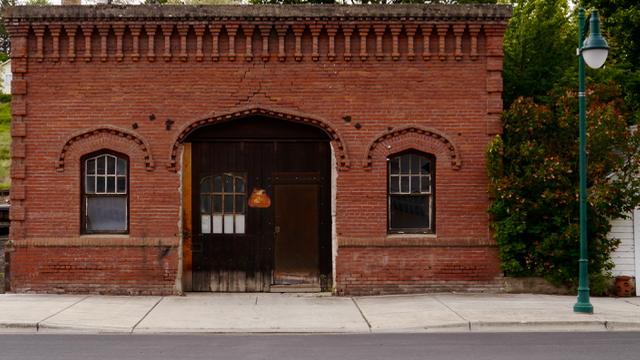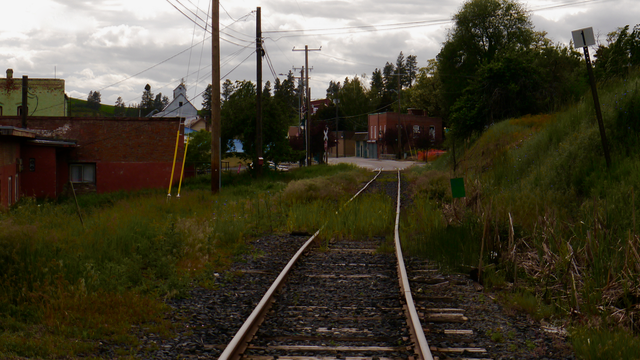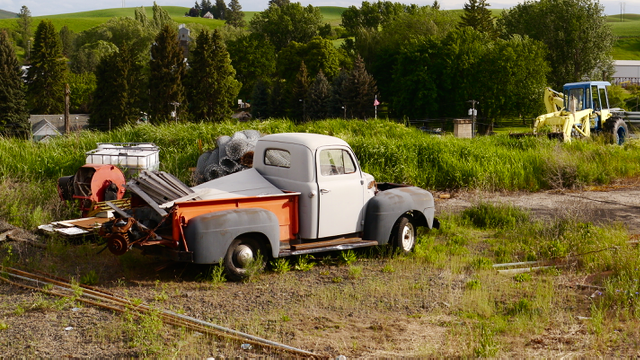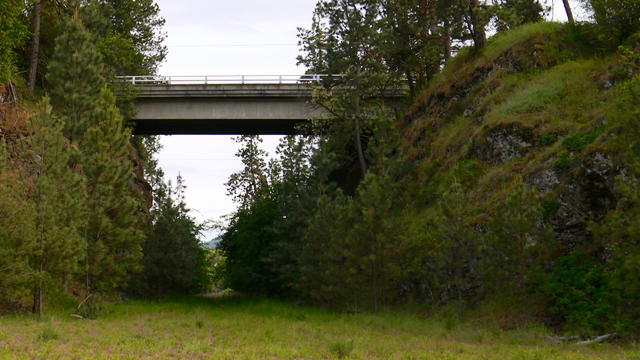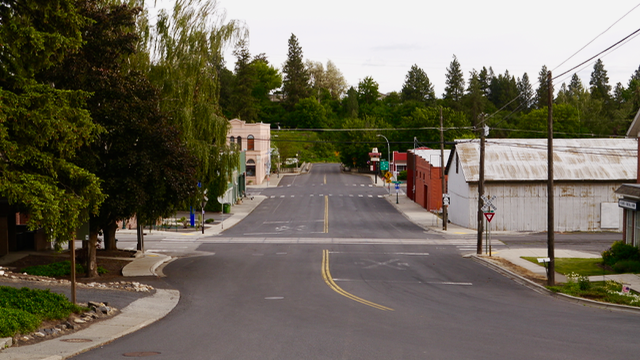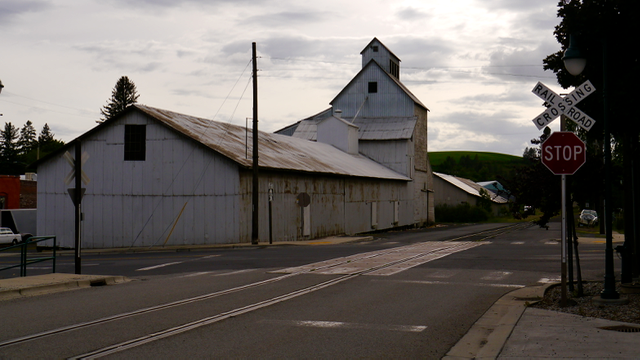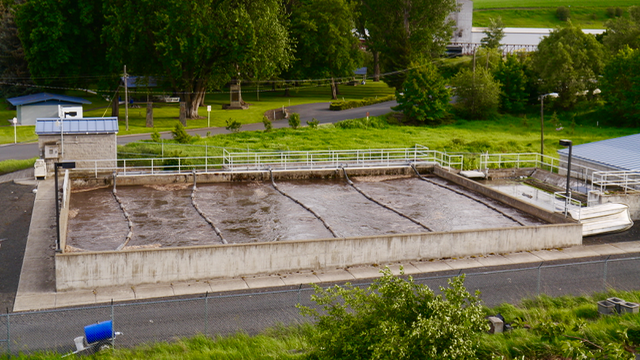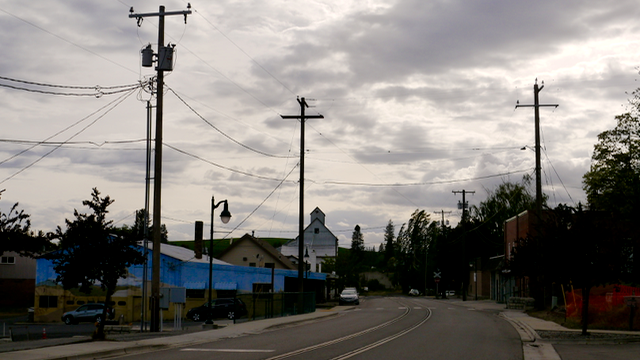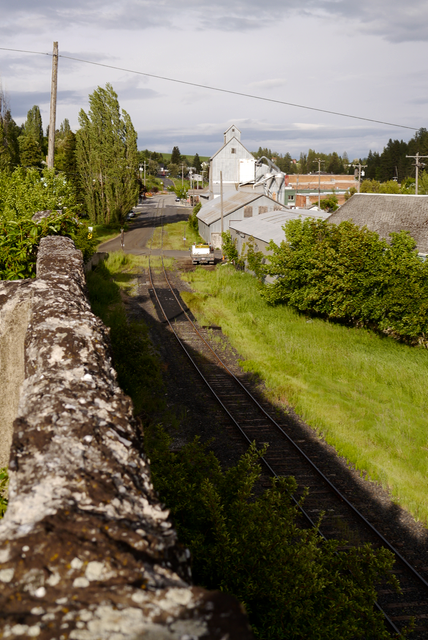Seven o’clock, the first Sunday evening in October, the sun low in the west. Everything looking old, chastened, wisened. The western wall of the seed warehouse, all three stories stripped of window frames. Like a face with the eyes plucked out, gape-jawed at the attacker, receding now over the horizon. The fourth and fifth floors heaped in sticks and planks and peels of aluminum. The railroad siding, vanished. The plant office, empty. A scrap piece of plywood hanging from two bent nails at opposite corners in one window. Orange spray-painted admonishment, “NO trEsspaSs!” Just past the edge of the pavement, a beam, brittle with time. Whole, intact on one end. The other end in the old railroad gravel, shattered into a hundred thousand splinters by truck tires. The shards of wood trail away along the paths of the passing vehicles, merging with the gray dirt and disappearing.
Looking at the ransacked face of the building, I get sentimental. “Even this looks better than whatever will replace it.” There is no remembrance of things past, nor will there be any remembrance of things to come. “What a cynical thing to say,” I think.
Late that spring, we had noticed that the salvage crew had left the building gaping open at its southeast end without so much as a piece of yellow tape to warn us away. “They don’t work on Saturdays, I’m sure,” I told Josh, “so we’ll have the run of the place.” He had spent part of his adolescence getting atop buildings that he should have left alone. “We’ll have a look around, and get up top.”
“Sure,” he said. “Let’s get some other guys.”
Saturday, 6 AM, the four of us—Josh, me, Nathaniel, Asher—stole over to the warehouse. The university had emptied of students for the summer, and the streets were quiet in the early morning calm. Our feet shuffled through thousands of bent nails fallen on the floor. Pigeons gurgled above us on the trusses. The murky light of early sun seeped through dirty windows. Men had built the warehouse in phases which were marked out by cinderblock firewalls. Before the last addition, the seed company had announced itself on the south-facing wall to the cars on the now-realigned highway. We tried reading the faded foot-high letters.
“THE HOME OF SUN-DRIED SEED FEED SPLIT PEAS.”
We entered the next section of building through the door between FEED and SPLIT. The darkness dimmed. Nathaniel tried his flashlight. The beam glowed feebly in the dust. Machines and scrap lumber were barely sensible, shapes darker than the darkness. We groped through the room. Someone’s foot shattered a pane of glass in a window laid on the floor. Light from outside shone like a blade etching out the outline of a sliding door. Walking toward it, I bumped into a solid, chest-high mass. Seed sacks, stacked in a pyramid, waiting for a boxcar that had left years ago. The light reached past me and sketched a handrail plunging down a hole in the floor to the sightless black basement. Nathaniel led us down.
Seed peas, years of them, hard little marbles, rolled around under our feet. Their dust choked, filling the cold air that caught in our throats and nostrils. Black-painted machines sprouted spigots and pipes and muck-crusted dials, eerie and silent, never again to do whatever it was they once did. A long white smear of mold grew on the foundation wall. The dirt in the crawlspaces reeked of mildew and animal urine. We fumbled toward a bright spot in the murk in the next room, holding our sleeves over our faces against the foul seed dust. Tied to a pipe on the wall, an old hemp rope coiled in the doorway. The other end plunged intently into the dirt, like someone was holding on. Mellow sunlight flowed through a gap between the building and foundation where some machine had once been bolted. We stuck our faces in the gap, spitting out the dark air, gulping in the morning, eye level with where the now plucked-up railroad tracks once rusted beneath the sun. “Why’d we come down here?” Josh said, and blew black things out of his nose into his handkerchief.
“Why not?” I said. The air had a taste. I wondered how far north the Junta virus might have come.
“Do you hear that?” said Asher. Wheels on gravel. We froze. A clean white car rolled by. We stepped back into the darkness until it passed.
“Students? Parking for free?” Josh suggested.
“Dude, is summer school already on?” Nathaniel peered through the gap, trying to see the car better.
“I dunno.”
“It’s Saturday,” I pronounced. “This place is ours.” I brushed a ladder rung free of peas and started up out of the basement.
The women inside laughed at one of the children. Outside, I leaned on the railing of the Joneses’ porch and looked at the farmland across the thin gravel road while I waited for Howard. The chaff on the ground looked like velvet, the low, dry garbanzo crop on the hilltops like the nap rubbed the wrong way, the tire tracks like someone had scribbled his fingers over the land. These fields had been farmed by Jones men since the 1920s, back when the State of Idaho offered a $150 bounty for a dead cougar. Howard’s grandfather, a superb hunter, bought the land with 150 cougars’ worth of bounties. He left the land to his son, who worked as a welder in Lewiston before settling down to farm. He, in turn, left the land to Howard. Howard had four daughters, two of whom had already taken new last names and were bearing grandchildren. At lunch, Mary his wife had told of the first time she saw him when they were missionaries in Guatemala. He was looking skyward at something too wonderful for him, and he pointed, speaking to no one in particular, “Praise the Lord —a red-tailed hawk.”
Dust plumed up behind Howard’s approaching truck. I walked down to meet him at the edge of the road. He was returning from Almota, on the Snake River, where he had dumped off his crop at the riverside silos. Getting into the cab I asked him about the drive.
“Oh, fine. I enjoy it quite a bit,” he said. “Those canyon roads are dramatic.”
“What’s the elevation drop?”
“From here to the river it’s, oh, a thousand, twelve-hundred feet. Most of it on the last three miles of the road. I remember when that road was gravel.” We crested a hill and saw, scattered throughout the sea of hills, the tops of several dark gray granaries, like up-ended ships.
“Look at them,” Howard said, shaking his head.
“There’s a lot of silos.”
“They put them in about every eight miles. Along the roads, beside the railroad sidings – and you wouldn’t believe all the railroads that ran through this country – every eight miles. The land produced so much, and you didn’t want to have to move your crop too far to store it. Now,” he said, slapping the steering wheel, “it all gets trucked down to the Snake River. You just don’t need those grain elevators anymore.” He pulled off the road onto a flat spot walled in by three hills. A combine soaked up the heat of the high sun. On the north hill, another combine followed a contour, eating its way toward us through the garbanzos. Howard’s son-in-law James was at the wheel. “Farming is just completely different now,” said the man, watching the combine. I waited, wondering if he at all pined for those inaccessible days, expecting him to wish out loud that things hadn’t changed the way they had.
A grasshopper, brown as the fields, landed on the windshield with a tap. Howard smiled. “Well, look at him.” The creature slid down onto the windshield wiper and waited there, indifferent to us. The combine rolled up alongside the truck, a roar of wind blowing chaff and dust across the hood. As the crop hit the empty bin behind our cab the whole truck shook. The grasshopper’s wings spread out, and he leaped into the wash of air-carried dirt and stubble, disappearing, leaving no trace.
“There he goes,” said Howard, just as surely as if he saw exactly where the grasshopper was.
Pulling our way up through the stories, leaping over coffin-sized holes in the floors, climbing over nail-snaggled debris to get to the next room, we regained confidence in our adventure. Next to a wall of dust-murky windowpanes, Nathaniel and I wrested open an elevator door and spit down the shaft. We heard it drop like coins into the fetid water that suddenly rippled light in the darkness three sto ries below. Josh, meanwhile, threw his shoulder into a stuck door. It budged open two inches with the sound of heavy sacks sliding over the floor on the other side. He and Asher worked the door open until they could slide through the crack. Nathaniel and I followed them in.
“When did they stop using this place?” Josh asked.
We stood in the plant office. A thin patina of dust diffused the sunlight through the windowpanes. A pair of work gloves on top of seed sacks. A jug of orange hand cleaner next to a faucet, a crystallized string of soap suspended from the spout. Open drawers, the contents askew like someone had just rifled through them. Barely legible bushel prices in columns on a chalkboard. On a desk by a bank of windows, an open notebook, an unfinished list on a page. A black ballpoint pen waiting uncapped to write again. The room looked like the men who worked there had only left for lunch and would return in a half-hour. I read the date on a corner of the open page and turned to Josh. “It says November, 2003.”
We squeezed back through the door. Josh leading, we followed the staircases and ladders upwards, wondering what sense the machinery once made, figuring out what levers did what, leaning over chasms to see where a pipe led or a chute stopped, puzzling over the stories-high system of funnels and pulleys and courseways for seeds, a mechanism that wasn’t in the building so much as it was an integral, load-bearing part of the structure. It, too, would be pulled apart, sheet by sheet, plank by plank, nail by nail. We found a room stinking of pigeon crap and ancient seeds, thick with old dust and cluttered with pieces of what was once the top of the machine. Nathaniel, Asher and I peered down the chute and the jumble of disjointed junk that had fallen into it. Josh went to a ladder in the corner and looked up.
“I think that’s the roof right there,” he said.
Atop the building we watched the day alight upon the town. In the right-angle arrangement of the old downtown buildings we saw how the streets once lay in a grid before the highway was realigned out of Main Street. By the height of the trees in the neighborhoods we could follow the progress of the platting and development of the town. Immediately below us we saw the bare gravel paths where two railroads once swept southeasterly between the town and university, the outlines of where the yards sprawled and the depot stood, how the sidings once spurred into every alley and nook among the elevators and silos and warehouses. The early morning light was calm and quiet over it all. I wanted to know how to stop time, how to keep it from destroying, how to keep this building in this light, how to keep it all right here.
James walked up alongside the truck cab. Howard rolled down his window. “What’s left up there?”
“I’ll be done with all that in a half-hour,” James said, stretching his arm out at the hill, “and then I guess you’ll head back to the river?”
Howard nodded and pointed west. “I’ll get that over there while you get the north.”
James gestured at the silent combine. “I think I saw a broken sickle on it. I was doing something else so I haven’t changed it yet.”
“Oh, yeah, I meant to do that,” said Howard. “I’ll put it back together and we’ll see how quickly I can get back to the river.”
Howard toted his wrench over to the other combine. I followed James up the ladder into the cab of his roaring vehicle. The cab was air-conditioned and a baseball game blared out of the tape deck. “Seattle’s winning,” James informed me. We rolled at the hill.
“They must not be playing the Yankees.”
“The Yankees are terrible this year! I hate the Yankees!”
“The Yankees own baseball.”
At the crop, James flipped a switch and the header went to work. The sickles sheared the low, dry vines. The reels spun like a Ferris wheel, their fingers pulling the crop into the maw of the combine. An augur spun down the axis, shunting the garbanzos into a rectangular hole at the center, where they disappeared. In the side mirror I saw the great swirling cloud of yellow dust exhausting from the rear of the tractor, the dust of the ground kicked up into a haze in the air by the mechanical violence going unseen within the combine. Through a small window in the rear of the cab I saw the little beans pouring into a bin.
“When they’re green, the garbs are really acidic,” James said. “You need to wear rubber shoes when you walk through them.” Amongst his shifting of levers he managed to also fidget with the radio. “That game’s over,” he said, “Boston’s playing Baltimore, though. I think I can find that one.” As the combine rolled around the hill I watched the land move through the windshield. To the north, the hills were creased with stands of yellow pine, dotted with houses and the peaks of granaries. The view west seemed to present only the formless mass of hills, rolling incomprehensible distances to the horizon line.
“Howard was telling me about the silos, that no one uses them anymore,” I said. James nodded.
“Most of ‘em are probably goners.” His radio hand paused at a drowsy-sounding announcer’s voice. “There’s the Boston game.” A high patch of thistles was swept into the combine. “I did a lousy job last Spring, packing thistle on this hill,” James laughed. Conversation topics arrived with James the way the weather changes in early April. “There were a lot of lousy movies this summer, weren’t there?”
“Man, you bet.”
“Yeah, I couldn’t believe how much money some of them made. Of course, I also went to see them—“ He suddenly leaned forward and looked down through the cab window at the header and the tangle of dry vines. “Shoot! Another sickle broke! That’s the third one today!”
James rolled the combine away from the crop and shut it down. Producing a wrench and a replacement sickle from a utility box, he crouched at the cutting edge of the header and set to work. The combine hunchbacked over him, the header grinning wide like the mandibles of a praying mantis. The sun sent down sterling clear light, its brightness almost blinding. “The acid eats right through the thread on your shoes. If you wear regular shoes they’ll fall apart in a few days,” he said.
“Huh? Oh, the garbs.” I looked at the ground. It had been harvested days ago and was matted with chaff. Amidst the straw I saw the little hard beans. Quite a few. “Can the combine get these?” I asked James, pointing.
He glanced over. “Nope. They stay where they drop.”
“That’s a lot of beans. You can’t get them?”
“It’s okay. They’ll go back in the soil, enrich it, break down. Howard says they’re great for the dirt,” he said. “One time, I wore brand-new boots through a garbanzo patch. That was stupid. I threw them out.” He put a few more turns on the replacement sickle and stood up. “Howard said that you’re either in on the joke, and you love what you do. You know it blows off like dust. Or you’re not in on the joke, and your work blows off like dust. And you hate it.” He stuck the wrench and broken sickle in the box and shut it.
“How much did those boots cost?” I asked. I was wondering about the joke.
“I don’t even remember,” James said. Suddenly, he grabbed a handful of the ground and picked the beans out of the clods and straw. He said excitedly, “You ever eaten a dry garb?” Taking a few beans, I popped them in my mouth. They were as hard as teeth, and about as flavorful. “Don’t chew them,” James offered, filling his lower lip. He brushed his hand off on his jeans.
“These don’t taste like much. Wheat has a taste, like bread. These taste like nothing,” I said, rolling them around over my tongue.
James shrugged. “I know. I just like eating them.” We got back in the combine and rolled at the crop. After several minutes, the garb softened. Layers of flavorless cellulose peeled off and I chewed them. In the back of my sinuses, the aroma of soil, coming from deep within the still-hard core of the bean.
Somehow, our early morning rooftop conversation turned to rock’n’roll.
“Dude, you know who M. Ward is touring with?”
“No.”
“Just guess. It’s terrible. Worst thing you can think of.”
“I can think of a lot of horrible things. Avril Lavigne.”
“Worse.”
“I dunno. Stun me.”
“Norah Jones.”
“No! That’s terrible! What the . . . ?”
We seemed to forget all about the view, the sunrise, the novelty. Soon we were mocking bands that had fallen by the wayside. “Remember in 1994, 1995, when Oasis was ‘the Savior of Rock’n’Roll’—when all the magazines were saying that?”
“They’re doing bar-mitzvahs and funerals these days.”
Our laughter floated out over the warehouse. Josh told stories of Eliot, his two-year-old, who had taken to biting other children. Like mine. And Nathaniel’s. “All our kids are gonna have Eliot stories. They’ll sit around telling them when they’re forty.”
“Hey! What’re you doing up there?” a voice called from below.
Josh leaned over and looked down the hole in the roof. “There’s a guy in a hardhat.”
“You guys gotta get down offa there, right now.”
He waited at the bottom of the ladder for all of us to climb down, and he followed behind us as we stepped down the treacherous pea-laden steps. Josh explained, “We were just wanting to see the view before it was, you know, gone.”
“Yeah, I know what you mean.” He was younger than any of us, with a claw hammer and crowbar banging on his calves through the loops on his work jeans. “OSHA would shut us down if they saw you without safety gear, running around this place.” His face was apologetic.
“Where you guys from?”
“We’re out of Rosalia. This is our second salvage job. We’re a new company.”
“You’re salvaging the place?”
“Every stick in this place is spoken for, just about. Wineries and restaurants want this old wood. Looks authentic.”
“You guys got more work?”
“Yeah, I think the contract got signed this week. We’re taking down, what is it, thirty-six of these places over the next few years.”
“Thirty-six?”
We left the building through the old front office door and followed the path of a ripped-up track toward downtown. Birds rioted among the new leaves of an alder tree that soared out of a dirt patch in the midst of the old gravel. “That went as well as it possibly could have,” said Josh. I looked over my shoulder at the roof where minutes before we had laughed over all the rooftops in town. The low, clear light of the morning etched it against the still-deep blue of the sky.
The last Sunday evening in October. Western larch, yellow on the dark piney mountainside to the south, candles in a dark room, the trees dying brightly in the peculiar light of autumn. At my feet, alder leaves, blowing like ashes in whirlwinds on the pavement. Clawed construction vehicles and stacks of salvaged wood. Heaps of scrap a story high. The upper stories gone. Studs from a wall shivering in the wind. The air chilled from days of now-departed rain.
At the south side of the building, even the floors—planks and joists—have disappeared. Just inside the gaping opening, a ceiling lamp dangles from its long silver cord. Before it, dirt, seeing daylight now for the first time in decades. It looks unsettled, like a field of graves opened.
I see a sliding door resting against the wall, battered green paint, broken windowpanes. Beside it, in the great square doorway in the wall, illuminated in the light of the sinking sun, the field-colored pyramid of seed sacks, unmoved since I last bumped into them. I wonder what one of them weighs.
Pulling one from the bottom corner is out of the question. The stack is too heavy; it may also collapse on top of me if I do this wrong. I need the one at the top. Where I’m standing, the floor is chest-high. A frayed rope dangles off the wall and I grab it. Pulling myself up I find other footholds and clamber awkwardly onto the pyramid, barely inside the building. The sacks have no obvious handles, nor is the weight stamped anywhere on them. There’s just the company logo – a rooster and some hills – and the characters of some Asian script. I lug the top sack toward me.
Its weight surprises me, throws me off balance. I fall from the doorway, the corner of the sack firmly grasped in my hand. It plummets with me over the threshold. A nail snags the sack and tears it lengthwise. I hit the ground. Cold, muddy gravel. Peas, greenish-white pieces, a cloud of dust, pour from the torn sack all over my feet, filling my shoes. I stand up, coughing, rubbing my backside, the seed sack weightless as wind in my hand.
This building, it seems, is in on the joke.
originally published in Credenda Agenda sometime in the mid-aughts


